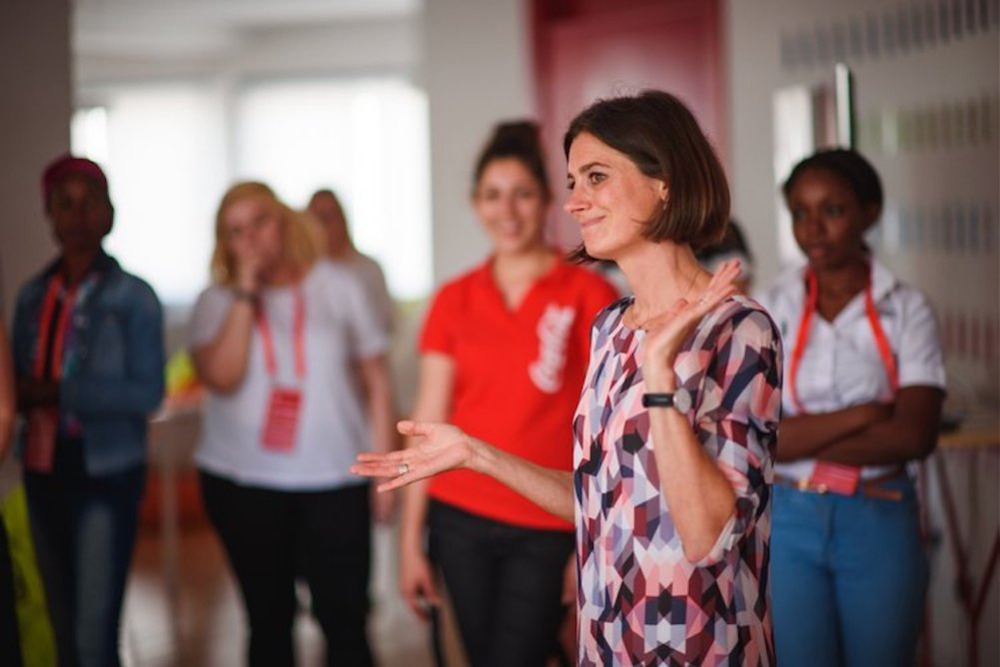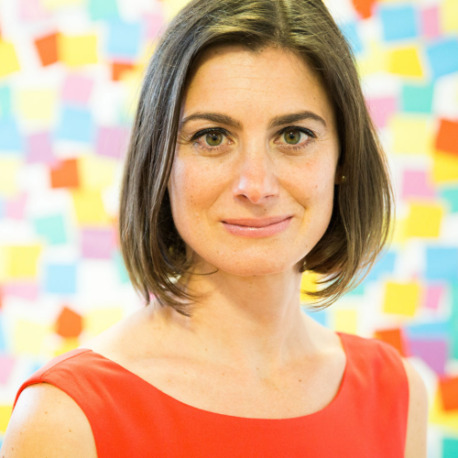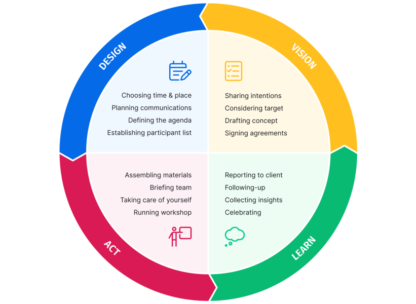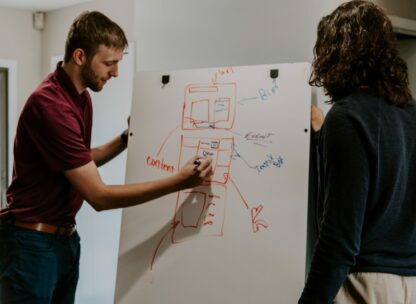How to improve the learning experience with workshop transitions

Most learning experiences guide participants through different blocks of content to help achieve the desired outcome. But how can you ensure that no one gets lost along the way? Workshop transitions are a method of seamlessly and purposefully moving between content blocks and engaging learners, but how do they work?
For this post, we talked to Anja Svetina Nabergoj - Lecturer at Hasso Plattner Institute of Design at Stanford University - about creating a more effective and engaging learning process by using purposeful transitions between workshop exercises. You'll learn what workshop transitions are and how to use them in your designs too!
All workshops and courses are an opportunity for learning. Whether it’s about learning new skills or brainstorming or developing solutions, facilitators need to consider how to design the ideal learning experience for their participants.
This means going beyond simply delivering content and instead, creating an experience that meaningfully engages your participants, helps learners retain information, and delivers better outcomes for all.
It’s about creating the right environment for learning, emotionally activating your participants, and preparing them for success at every step of the process.
We and Anja explore why you might want to become more mindful when using transitions in your workshops, courses, and lessons. We reflect on what makes a good transition, and how to factor these into your learning experience design.
Thanks to Anja for providing her insight, quotes, and images for this post. We found the subject massively inspiring and we hope you do too.
Let’s dive in!
What are workshop transitions?
Every workshop, training course or lesson includes content that needs to be delivered. These might be activities, learning modules or discussion blocks. As you go through a training program or workshop, you’ll proceed through content in the hopes of reaching the goal of the session.
In simple terms, a workshop transition is a way to move between different items of content meaningfully, purposefully and without friction – all with the goal of creating a seamless and memorable learning experience.
A transition might be anything from an energizer to a reflective exercise though the key distinction is that a transition is designed to purposefully help a group go from one task to another without breaking the flow and to help create an ideal learning experience through emotional engagement and presence in the session.
“You can have the most spectacular content in the world but if the learning experience is not done in a way that extends the forgetting curve and helps the group retain knowledge or experience, then even the best content is irrelevant.”
Think of how a DJ might perform a set. If one song stops suddenly and there is a gap before the next, this can disrupt the flow and mean people are not prepared for the following song. Some people will stop dancing and be unable to start again, others might try to dance and have it be awkward whereas some people might even leave the club entirely!
The most amazing DJs are masters of transition. They flow from one song to another seamlessly, creating a flow that takes the audience on an emotional journey. They build suspense, build anticipation and trigger different kinds of emotions in the audience. And they do that with attention and intention. No songs or beats are just left hanging.
Very similarly in the classroom, transitions are not there just to stitch together pieces of content. Transitions in a classroom or workshop setting are designed to maintain the flow of learning and put people into the right frame of mind for the learning experience you are trying to deliver.
For example, you might employ a brainstorming game to transition from a discussion to a high-energy activity so that everyone in the group is put in the right frame of mind to contribute to the next section.
If the transition is carefully designed and employed with purpose it can not only be an important learning experience but it can improve the outcomes of your main activities and help people engage with the content in a more emotional manner. Learning how to use workshop transitions can be a great way to supplement your existing facilitation skills!
“It all goes back to intention. Transitions need to be very specific to what’s coming. Are you brainstorming next? Are you going into deep listening? Do you need to be calm and peaceful or do you need to be stoked and energized?”
What makes a good transition?
A good transition should be purposeful, specific, and designed to support the learning experience you are creating. Transitions are not fillers – they should help participants and learners move between tasks and position them for success in the next. Let’s look at an example from Anja.
Wonder, Wander
A great transition that we use in our d.school programs before going into a brainstorming session is called Wonder, Wander. It is a simple transition exercise that helps participants learn the value of being present and looking to outside sources for inspiration in a gentle, refreshing manner. As Anja explains:
“The idea is that you keep the question that you are solving or the project you’re working on in mind while going for a 15 minute walk away from the computer. And you look for objects that maybe on a regular walk, you don’t even notice. And you see a traffic light, or you see somebody picking up dog poop, or you hear a car honking. And you take that thing that you see and consider how it connects to my problem? Can I use this element to solve my problem or can I approach it from that perspective?
Let’s say you see a preschool teacher with small kids. And you would say, hey, how would the preschool teacher solve the problem I have? Or you would see somebody playing basketball and ask how might I bring a basketball hoop into my solution. It’s not just there to get people out and get fresh air and take a break. It’s actually designed to make them realise the power of inspiration that comes from the outside. For every single part of our Innovation Bootcamp at Stanford, we have an exercise that helps get the group in the right state of mind.”
As you can see here, the Wonder, Wander exercise accomplishes a lot in a short period of time and creates space for participants to take a breath, learn something new, be present, and come back to the workshop space recharged and with something new to offer.
There is always value to having breaks and space for individual thought, but when designing a program or workshop, consider how a more mindful, purposeful approach to the space between modules or blocks can help improve engagement and create a deeper learning experience.
First Letter, Last Letter
Purposeful transitions can be about helping participants be present and engaged in preparation for an exercise by using some of the same principals or skills. First Letter, Last Letter is a transition exercise that borrows from improv theatre to help people practice active listening ahead of a session.
“You pair up with somebody and begin an interview by asking a question. Let’s say I ask, what did you have for breakfast today? And you will start telling me, and then you will end the sentence, you’d say, oh, and then I put things in a dishwasher. I need to use the last letter of your last sentence to start a new question. So my new question needs to start with the letter R because the last word – dishwasher – ends with R.
What this exercise teaches you is that you cannot have a predefined list of questions to meaningfully engage in a conversation. Your questions must follow up on the story that you just heard, and you can’t know what the story is going to be ahead of time. It also forces you to truly listen. Very often, we don’t truly listen because we’re thinking about what our next question will be. The exercise helps prevent that impulse because I never know which word is the last word all the way. I have to listen and I have to be present in the conversation.”
As an improv game, First Letter, Last Letter is a fun way to practice active listening and get to know people, but when used as a transition in a user interview session, it does double duty and helps also deppen the learning experience that follows the game.
As Anja explains: “Being intentional when using transitions is critical. For example, a person who does this exercise and goes into an empathy interview, compared to somebody who is dropped in without a transition – the experience they have will be different. In terms of what they learn and how they feel, and how memorable the learning experience will be. Using this transition helps set people up in the right mode to engage in the next module.”
How to use workshop transitions
Transitions are a great way to maintain engagement, create memorable learning experiences and help build better outcomes with an effective flow.
Bringing transitions into your workshop or course can have a largely positive effect on the outcomes of your program. But how do you use them in practice? Let’s explore!
Start with purpose
When designing a workshop or course, a great place to start is with purpose. What are you trying to achieve with this content and what is its purpose? Let’s say you have a problem-solving workshop – the purpose of this might be to surface and then solve organizational challenges.
As you design your agenda, you’ll include a mix of activities to help participants productively surface challenges, build and develop skills and solve problems effectively.
Taking a group of participants through a workshop is like taking them on a journey and requires more thought and guidance than simply placing major tasks or modules one after the other. This is where transitions come in. Not only should they help support the overall process, but they should also contribute to session flow and ensure that participants are emotionally engaged at every stage.
When thinking of how to introduce transitions into your agenda, always start with purpose and design transitions that support that goal.
“The Forgetting Curve makes me think that why and how we teach is more important than content because if we get that right the content actually gets across to people’s hearts and minds.”
Work to extend the Forgetting curve
In educational science, the forgetting curve is the rate at which information is lost when there are no efforts made to retain that information. Originally posited by Hermann Ebbinghaus, the forgetting curve states that information is lost in a matter of days without efforts made to consciously retain, review and relearn the material.
Typically, the stronger a memory is, the longer it is retained for. So creating memorable experiences is vital to helping a group retain the information presented in a workshop or course.
As Anja puts it: “In order to create a memorable learning experience, the workshop needs to trigger an emotional response in participants. If you think about your own learning experiences, you remember those that triggered positive emotions or negative ones. It can’t be flat.”
Transitions are used to help reinforce learnings, prepare a group for emotional engagement and build stronger responses to the material – this is key to ensuring the material you deliver is memorable and that you can extend the forgetting curve as a result.
Consider whether you are transitioning people into or out of a task
When thinking about the purpose of your transition, consider whether you are preparing your participants for the next module or bringing them out of a previous activity. This might be the difference between using a reflective transition to help solidify the learning of a discussion or help prepare the group for a user research task with a transition that focuses on active listening.
Be sure to think about the flow of your session and how your transition is going to help speed up or slow down the thinking process and support the learning experience you want to create at any given moment.
Pair transitions with content and your desired learning experience
Just as not all energizers or games are right for every workshop, not every transition is right for every learning experience. The best transitions help reinforce the learnings of your content or prepare your group for the next module. You should design your transitions to compliment your content and help support the tasks at hand.
If you are running a brainstorming session and want to create space for participants to find innovative solutions, a transition like Wonder, Wander pairs perfectly with the content you are delivering and the learning experience you want them to have. Consider how the strong emotional response to finding inspiration in an unexpected place during that transition can engage participants and lead to a more engaging ideation experience.
“I think it all starts with care. When you deeply care about your participants then you will carefully think about and intentionally design their learning experience.”
Cultivate your emotional intuitiveness
As facilitators, we need to be emotionally attuned to the audience and pay attention to how participants are responding to the learning experience. In the moment, this can mean recognizing when some content isn’t connecting, when energy levels need to be raised, or when you risk leaving someone behind.
As Anja notes: “The challenge for us is that we’re not on a therapist couch one on one. When we have twenty to thirty people in a workshop, it’s very easy to lose five or six. Either losing their attention or losing them energetically required the facilitator to adapt and bring everyone on board. In virtual settings, this is even more important because a distraction is less than a click away.”
If you’re aware of the emotional state or energy levels of everyone in the room, you can then tailor your transitions to reflect this. If energy levels are low, perhaps swap out a reflective transition for an energizing transition. If people are having difficulty processing the content, perhaps include a transition to improve understanding and encourage more present listening. Being emotionally tuned in to your participants, you can pick the right transition for any situation.
In conclusion
Personally engaging moments are a major part of creating memorable learning experiences and ensuring the efficacy of the content delivered during the workshop.
Using workshop transitions to help your participants get emotionally and intellectually primed for workshop content is a great way to help your participants remember what they have learned long after they’ve left the workshop.
Do you use transitions in your workshops, classes, or courses? Might you use transitions in the future? We’d love to hear from you in the comments below!
About Anja Svetina Nabergoj

Anja Svetina Nabergoj (PhD) is Lecturer at Hasso Plattner Institute of Design at Stanford University, where she teaches Executive Education programs and co-teaches graduate classes. For the last 10 years she has been developing pedagogy for teaching innovation processes and nurturing creative mindsets.
She has been working with top management teams from organizations across Europe, Asia and USA including Microsoft, Bill&Melinda Gates Foundation, JetBlue, Uber, GM, Genentech, Arla Foods, Leo Pharma, Novo Nordisk Engineering, Symbio, Coca Cola, Telenor, Kellog’s, Microsoft and Visa. Anja facilitates design thinking workshops, teaches ethnographic research techniques and leads senior leadership sessions on user-centered innovation.
Anja is on the Advisory Board of The Stanford Catalyst for Collaborative Solutions, which is a new initiative with a bold mission to create an open space to explore uncommon interdisciplinary solutions to the world’s most pressing challenges. Stanford University aims to build an internationally recognized model of purposeful, high-impact and interdisciplinary research ecosystem.
She has contributed chapters to books published by Edward Elgar and Routlege and scientific management journals, including European Management Journal. With her team she founded a Research as Design project at Stanford University introducing creative problem solving techniques to scientists. They recently published a book Creativity in Research: Cultivate Clarity, Be Innovative, and Make Progress in your Research Journey that was published with Cambridge University Press.
She splits her time between Palo alto, California and Ljubljana, Slovenia, where she is an Associate Professor of Entrepreneurship at the University of Ljubljana.



Leave a Comment